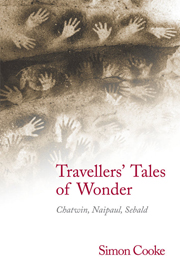Book contents
- Frontmatter
- Contents
- List of Illustrations
- Acknowledgements
- Introduction: The Wonder that Came Later
- I ‘Horizon of expectations’: Travels in Literary History
- II Readings in Contemporary Travellers' Tales of Wonder
- 4 Bruce Chatwin and the ‘modern WONDER VOYAGE’: In Patagonia (1977)
- 5 V. S. Naipaul and the ‘gift of wonder’: The Enigma of Arrival (1987)
- 6 W. G. Sebald's Travels through ‘das unentdeckte Land’: Die Ringe des Saturn (1995)
- Afterword: The ‘unlimited vicissitudes of travelling’
- Bibliography
- Index
6 - W. G. Sebald's Travels through ‘das unentdeckte Land’: Die Ringe des Saturn (1995)
from II - Readings in Contemporary Travellers' Tales of Wonder
Published online by Cambridge University Press: 05 October 2013
- Frontmatter
- Contents
- List of Illustrations
- Acknowledgements
- Introduction: The Wonder that Came Later
- I ‘Horizon of expectations’: Travels in Literary History
- II Readings in Contemporary Travellers' Tales of Wonder
- 4 Bruce Chatwin and the ‘modern WONDER VOYAGE’: In Patagonia (1977)
- 5 V. S. Naipaul and the ‘gift of wonder’: The Enigma of Arrival (1987)
- 6 W. G. Sebald's Travels through ‘das unentdeckte Land’: Die Ringe des Saturn (1995)
- Afterword: The ‘unlimited vicissitudes of travelling’
- Bibliography
- Index
Summary
Alles würde man wundervoll empfinden, wenn man alles empfände, denn es kann ja nicht eines wundervoll sein und das andere nicht. [One would sense everything to be wonderful, if one sensed everything, for it surely cannot be that the one thing is wonderful and the other not.]
Robert Walser, as quoted in a frieze of quotations found in the interiors of Swiss trainsIt seems fitting for a study in contemporary literary history to culminate in a reading of W. G. Sebald. The body of work he brought into expression from the late 1980s through to his death in a car accident in 2001, not far from his adopted home of some twenty years near Norwich, England, was itself a culmination, the harvest of a long personal apprenticeship: a German émigré, Sebald had been active as an academic in England since the 1960s, and was a professor of European literature at the University of East Anglia when his first major ‘non-academic’ work, the ‘elemental poem’ Nach der Natur, was published in 1988 (Michael Hamburger's translation, After Nature, was published in 2002). In literary and cultural terms, too, Sebald's work seems to respond, uniquely but representatively, to any number of preoccupations in late modernity. Born in 1944 in the village of Wertach im Allgäu in the German Alps, Sebald figured his own biography as indirectly but profoundly marked by the catastrophe of the Second World War: his work has frequently been read in terms of its tangential but pervasive response to traumatic history, and to the Holocaust in particular.
- Type
- Chapter
- Information
- Travellers' Tales of WonderChatwin, Naipaul, Sebald, pp. 136 - 174Publisher: Edinburgh University PressPrint publication year: 2013

